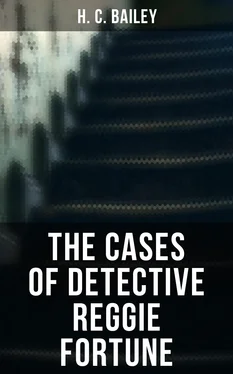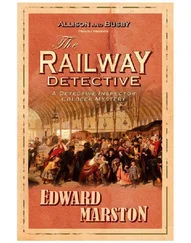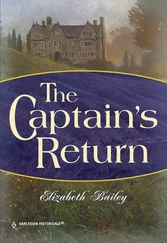“Sudden death at Ascot—in the Royal Enclosure too,” he explained. “That’s very startling and conspicuous. The poor fellow hadn’t been ill, as far as we can learn. Naturally we have to seek for any explanation.”
So at last Osbert came out with: “What, sir, you don’t mean to say, sir—suspect foul play?”
“Oh, my dear Colonel, you wouldn’t suggest that?”
“I, sir? Never entered my head. Poor dear Arthur! A shock, sir. A blow! Getting old, of course, like the rest of us.”
“Ah, had he been failing?” said Reggie sympathetically.
“Well, well, well. We none of us grow younger, sir.” Colonel Osbert shook his head. “But upon my soul, Mr. Lomas, I don’t understand the action of your department.”
“I’m so sorry you should say that,” Lomas sighed. “Now I wonder if you have particular reason for wanting Sir Arthur’s papers at once?”
“My good sir, I am his executor. It’s my duty to take charge of his papers.”
“Quite, quite. Well, they’re all safe, you know. His death must have been a great shock to you, Colonel.”
“Shock, sir? A blow, a blow. Poor dear Arthur!”
“Yes, too bad,” Lomas mourned: and voice and face were all kindly innocence as he babbled on: “I suppose you heard about it from his son?”
Colonel Osbert paused to clear his throat. Colonel Osbert stopped that one. “Major Dean? No, sir. No. Point of fact, I don’t know who the fellow was. Some fellow called me up on the ’phone and told me poor dear Arthur had fallen down dead on the course. Upon my soul, I was knocked over, absolutely knocked over. When I came to myself I rushed round to secure his papers.”
“Why, did you think somebody would be after them?”
“My dear sir!” Colonel Osbert protested. “Really, now really. It was my duty. Arthur was always very strict with his papers. I thought of his wishes.”
“Quite, quite,” Lomas purred, and artless as ever he went on: “Mrs. Dean was round at the flat too.”
“God bless my soul!” said Colonel Osbert.
“I wonder if you could tell me: is there anyone who would have an interest in getting hold of his papers?”
Colonel Osbert again cleared his throat. “I can tell you this, sir. I don’t understand the position of Mrs. Dean and her husband. And I shall be glad, I don’t mind owning, I shall be very glad to have poor dear Arthur’s papers in my hands.”
“Ah, thank you so much,” said Lomas, and with bland adroitness got Colonel Osbert outside the door.
“He’s not such a fool as he looks,” Reggie murmured. “But there’s better brains in it than his, Lomas old thing. A bad business, quite a bad business.”
And then a clerk came in. Lomas read the letter he brought and said: “Good Gad! You’re an offensive person, Fortune. Why did you tell me to go to the Foreign Office? Here is the Foreign Office. Now we shall be in the affair for life. The Foreign Office wants me to see His Excellency Mustapha Firouz.”
“Accompanied by Sindbad the Sailor and Chu Chin Chow?” said Reggie. “Who is he?”
“Oh, he’s quite real. He’s the Median Minister. He—Why what is it now?” The question was to the clerk, who had come back with a card.
“Says he’s anxious to see you immediately, sir. It’s very urgent, and he won’t keep you long.”
“Major Dean,” Lomas read, and lifted an eyebrow.
“Oh rather. Let ’em all come,” said Reggie.
It was Major Dean, and Major Dean ill at ease. He had a difficulty in beginning. He discovered Reggie. “Hallo! I say, can you tell me anything?” he blurted out.
“I can’t,” said Reggie sharply. “I don’t know why your father died,” and Major Dean winced.
“I thought you had something to tell us, Major,” Lomas said.
“Do you believe he was murdered? I’ve a right to ask that.”
“But it’s a very grave suggestion,” Lomas purred. “Do you know of anyone who had a motive for killing your father?”
“It’s this filthy mystery,” the Major cried. “If he was murdered, I suppose he was poisoned. But how?”
“Or why?” said Reggie.
The Major fidgeted. “I dare say he knew too much,” he said. “You know he was the adviser to the Median Government. He had some pretty serious stuff through his hands. I don’t know what. He was always great on official secrecy. But I know he thought it was pretty damning for some one.”
“Ah, thanks very much,” Lomas said.
But the Major seemed unable to go.
“I mean to say, make sure you have all his papers and stick to ’em.”
Lomas and Reggie studied him. “I wonder why you say that?” Lomas asked. “The papers would naturally pass to Colonel Osbert.”
“I know. Osbert was the guv’nor’s best pal, worse luck. I wouldn’t trust him round the corner. That’s what I mean. Now I’ve done it, I suppose”; he gave a grim chuckle. “It is done, anyway”; and he was in a hurry to go.
Reggie stood up and stretched himself. “This is pretty thick,” said he, “and we’ve got His Excellency the Pasha of Nine Tales on the doorstep.”
Into the room was brought a man who made them feel short, a towering man draped in folds of white. Above that flowing raiment rose a majestic head, a head finely proportioned, framed in hair and beard of black strewn with grey. The face was aquiline and bold, but of a singular calm, and the dark eyes were veiled in thought. He bowed to each man twice, sat down and composed his robe about him, and it was long before he spoke. “I thank you for your great courtesy”: each word came alone as if it was hard to him. “I have this to say. He who is gone he was the friend of my people. To him we turned always and he did not fail. In him we had our trust. Now, sir, I must tell you we have our enemies, who are also, as it seems to us, your enemies. Those whom you call the Turks, they would do evil to us which would be evil to you. Of this we had writings in their hands and the hands of those they use. These I gave to him who is gone that he should tell us what we should do. For your ways are not our ways nor your law our law. Now he is gone, and I am troubled lest those papers fall again into the hands of the Turks.”
“Who is it that Your Excellency fears? Can you tell me of any man?” Lomas said.
“I know of none here. For the Turks are not here in the open and this is a great land of many people. Yet in all lands all things can be bought at a price. Even life and death. This only I say. If our papers go to your King and the Ministers of your King it is well and very well. If they are rendered to me that also may be well. But if they go I know not where, I say this is not just.”
“I can promise Your Excellency they will go before the Foreign Office.”
The Median stood up and bowed. “In England I never seek justice in vain,” he said.
And when he was gone, “Good Gad, how little he knows,” said Lomas. “Well, Fortune?” but Reggie only lit a cigar and curled himself up on the sofa. “What I like about you is that you never say I told you so. But you did. It is a Foreign Office touch,” and still Reggie silently smoked. “Why, the thing’s clear enough, isn’t it?”
“Clear?” said Reggie. “Oh Peter! Clear?”
“Well, Sir Arthur had in his hands papers damaging to these blood-and-thunder Young Turks. It occurred to them that if he could die suddenly they might arrange to get the papers into their hands. So Sir Arthur is murdered, and either Osbert the executor or Major Dean the son is bribed to hand over the papers.”
“In the words of the late Tennyson,” said Reggie,
“And if it is so, so it is, you know;
And if it be so, so be it.
But it’s not interesting, Lomas old thing.”
Читать дальше












